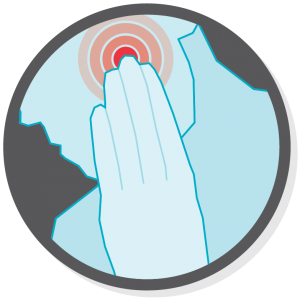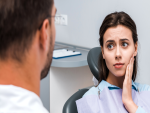The scientific term for teeth grinding is bruxism. There are two main types of bruxism: teething grinding at night while you sleep and teeth grinding while awake.
In some patients, teeth clenching and grinding can lead to symptoms such as tooth sensitivity, tooth loosening, jaw pain, headaches, and broken teeth and/or fillings.
Research has shown that we should only have our teeth closed tightly together for about 15 minutes a day. So far, there hasn’t been any studies that definitively prove stress from the pandemic can cause the tooth damage or pain. However, it’s reasonable to assume that increased stress in our lives can result in bruxism. It can be difficult to determine whether stress causes nighttime teeth grinding and disrupted sleep, or that the sleep disorder itself is associated with the bruxism, which leads to daytime mood changes and other issues.
Stress is not the only cause of bruxism. Patients with sleep apnea, taking certain antidepressant medications and with neurologic conditions can also be affected.

No matter the cause, if you have noticed the symptoms associated with tooth grinding there are some things that you can do right away to help. During the day, relaxation exercises, mindfulness and a few other easy tricks can be done at your desk or workstation. If you notice your teeth are together or clenched, place the top of your tongue against the roof of your mouth so your teeth come apart. Relaxation techniques are very helpful especially before you go to bed at night.
If you have tooth pain, contact your dental office for advice and assistance. For bruxism occurring at night, many dentists recommend an oral appliance that is known as a splint, occlusal guard or nightguard. This custom-fitted device is made at your dental office and is much better than the soft devices that you can buy over the counter. In fact, sometimes these soft guards can make bruxism worse.
A recent study from Israel and Poland in the Journal of Clinical Medicine used a questionnaire to see if participants had worsening symptoms of bruxism during the COVID-19 pandemic. They found that after Israel’s first lockdown there was an increase in orofacial pain, which they noted is a symptom often associated with stress and anxiety. In their sample, they found that orofacial pain increased from about 35 percent prior to pandemic to 47 percent during the pandemic. They also noted that nighttime grinding went from 10 percent to 36 percent.
If you notice problems that are associated with teeth grinding and clenching, you should speak with your dentist. They are well prepared and able to help.
Source: Emodi-Perlman, A.; Eli, I.; Smardz, J.; Uziel, N.; Wieckiewicz, G.; Gilon, E.; Grychowska, N.; Wieckiewicz, M. Temporomandibular Disorders and Bruxism Outbreak as a Possible Factor of Orofacial Pain Worsening during the COVID-19 Pandemic—Concomitant Research in Two Countries. J. Clin. Med. 2020, 9, 3250.
This information in this post is for general educational purposes only and does not warrant or represent any information as related to health as specifically appropriate for you. It is not intended to be medical advice or replace the relationship that you have with your health care providers. You should always seek medical advice on any diagnosis or treatment from a qualified health care provider. The information is provided “as is” without any representations or warranties, express or implied.







